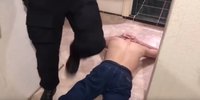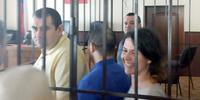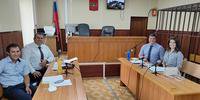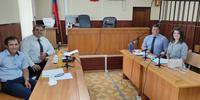Case of Abdullaev and Others in Makhachkala
Filter
- #
The FSB initiates criminal proceedings for faith under Article 282.2 (1); According to the investigation, several local residents "organized religious gatherings, the so-called 'meetings,' during which they conducted a study of printed materials of the banned organization 'Administrative Center of Jehovah's Witnesses in Russia' with the participation of residents of the Republic of Dagestan." Arsen Abdullaev, Maria Karpova, Anton Dergalev and Marat Abdulgalimov become innocent victims of law enforcement officers. The Sovetsky District Court of Makhachkala sent them to a pre-trial detention center for 2 months.
- #
The Investigative Directorate of the Federal Security Service of Russia for the Republic of Dagestan conducts searches in Makhachkala, Kaspiysk, Kizlyar, and Derbent in 10 houses of law-abiding local residents who are accused of practicing the religion of Jehovah's Witnesses.
- #
- #
Dalgat Hajiyev, judge of the Sovetsky District Court of Makhachkala, orders to extend the imprisonment of all four believers for 2 months, until September 27.
- #
- #
The imprisonment of all four has been extended until November 27, 2019.
- #
The imprisonment of all four was extended until January 27, 2020.
- #
The imprisonment of all four was extended until March 27, 2020.
- #
The Supreme Court of Dagestan cancels the decision of the Sovetsky District Court to extend the detention until March 27, 2020. At the same time, the court does not release believers from custody, extending the term of imprisonment by 2 weeks (until February 27), and sends the case for a new trial in a different composition of the court.
On February 26, at 10:30 a.m., the Fifth Court of Cassation of Pyatigorsk will consider a cassation appeal against previous decisions of the Supreme Court of Dagestan. Earlier, the prisoners received a response from the judge of the Court of Cassation, which said that the court found a number of serious violations in their case.
- #
The Sovetsky District Court of Makhachkala extends until March 27, 2020 the period of stay in the pre-trial detention center of four arrested for their faith.
In addition to lawyers, about 10 friends and relatives come to support believers in court - not all of them who wanted to be at the hearing. According to the wife of one of the arrested, their relatives were not informed about the date of the court hearings, so many went to Pyatigorsk, where on February 26 a meeting of the cassation instance on complaints about the arrest of Maria Karpova and other detainees was to be held.
Before the trial begins, an FSB operative named Ignatiev does not let anyone inside until he receives a copy of his passport and issues a summons for interrogation. Those who come file complaints about these actions with the chairman of the court and the prosecutor's office.
- #
At 10.30 a.m., it is planned to consider the cassation appeal of Maria Karpova and the other three accused. About 400 people gather outside the Court of Cassation in Pyatigorsk to support four fellow believers, despite the fact that a day earlier many of them were handed summonses for interrogation by the FSB, including a minor. According to the teenager's mother, the investigator threatened to imprison him next year.
About 15 people are allowed into the small courtroom. There are no lawyers for the accused at the trial, only three judges and a prosecutor are present. After many hours of waiting, court officials report that it is not possible to establish contact with the Makhachkala detention center, where the accused are located.
The court adjourned the hearing to March 4, 2020.
- #
The Court of Cassation in Pyatigorsk upholds the complaint about the repeated extension of the arrest of Maria Karpova, Anton Dergalev, Marat Abdulgalimov and Arsen Abdullaev, thus recognizing their detention as illegal.
However, this does not mean that they will be released. Believers have repeatedly appealed to the Supreme Court of Dagestan, challenging the decision to extend the arrest, and the Court of Cassation considered only one of its decisions, issued in October 2019. After that, the arrest was extended several more times, and these decisions have not been canceled.
Nevertheless, the Supreme Court of Dagestan, when considering the next appeals against the extension of the arrest, will have to take into account the cassation ruling issued on March 4.
More than 500 people come to support the believers, but only 15 of them get into the hall, like last time.
- #
The Supreme Court of Dagestan rejects the appeals of four defendants about the illegal extension of their arrest.
The court also refuses the defense's request to attach to the materials the ruling of the Fifth Court of Cassation of General Jurisdiction in Pyatigorsk dated March 4, 2020. The ruling, among other things, noted that the court of first instance did not provide strong reasons for extending the arrest of each of the accused and committed "significant violations of the criminal procedure law", which the court of appeal did not eliminate. The Court of Cassation considered these violations to infringe on the rights of the accused to liberty and security of person, guaranteed to them by Article 22 of the Constitution of the Russian Federation.
Except for the direct participants in the process, no one else is allowed to attend the hearing. Relatives and close friends of the accused cannot be in the courtroom, even while wearing medical masks.
Relatives of believers report that they managed to get permission from the investigator for visits. However, due to the coronavirus pandemic, quarantine has been declared in the pre-trial detention center, and all visits are prohibited.
- #
The believers are charged in the final version. Maria Karpova is charged under Article 282.2 (1) and Article 282.2 (1.1) of the Criminal Code of the Russian Federation. Anton Dergalev, Arsen Abdullaev and Marat Abdulgalimov were charged under Articles 282.2 (1) and 282.3 (1) of the Criminal Code of the Russian Federation.
- #
The Supreme Court of Dagestan decides to release Maria Karpova, Anton Dergalev, Marat Abdulgalimov and Arsen Abdullaev from the pre-trial detention center and send them under house arrest.
- #
The Fifth Court of Cassation of General Jurisdiction in Pyatigorsk ruled that the detention of Karpova, Dergalev, Abdulgalimov and Abdullaev in the pre-trial detention center was illegal. The court declares illegal the extension of their preventive measure from January 27 to May 27, 2020. (Previously, this court of cassation had already granted a complaint about the extension of their arrest, and after 2.5 months they were released from the pre-trial detention center under house arrest.)
- #
- #
The criminal case is submitted to the Kirovsky District Court of Makhachkala for consideration by Judge Amir Amirov with the participation of prosecutor Magomed Aliyev.
- #
Judge of the Kirovsky District Court of Makhachkala, Amir Amirov, refuses to satisfy the request to return the criminal case to the prosecutor against four believers.
- #
The prosecutor reads out the indictment.
The court rejects the believers' petitions to refuse appointed lawyers and public defenders.
All the defendants claim their innocence. They emphasize that they are peaceful people and their actions have never been aimed at inciting hatred, enmity and humiliation of human dignity. "I don't conflict with people. I have no enemies. My views are directly opposite to what is called extremism," explains one of the defendants.
The prosecutor reads out the indictment. The court rejects the believers' petitions to refuse appointed lawyers and public defenders.
All the defendants claim their innocence. They emphasize that they are peaceful people and their actions have never been aimed at inciting hatred, enmity and humiliation of human dignity. "I don't conflict with people. I have no enemies. My views are directly opposite to what is called extremism," explains one of the defendants.
- #
The court shall not allow public defenders to participate in the hearing.
Prosecution witnesses are being questioned. FSB officer Ignatiev, who conducted operational-search activities (ORM), cannot explain to the court for what actions local religious associations of believers were banned. He learned about the activities of Jehovah's Witnesses from the Internet, did not check the accuracy of the information, since this was not part of his duties.
V. B. Israpilov, an employee of the Center for Countering Extremism in the Republic of Dagestan, not being an expert in the field of phonoscopy, insists that the voices of the defendants are heard on the audio recording provided in court.
- #
The court is questioning 5 witnesses for the prosecution. They say that they have never heard calls against the overthrow of the government and the existing system from any of the defendants.
- #
The court is questioning a prosecution witness who has known the defendants for more than 12 years. She reports that they never coerced, intimidated or threatened her with anything. "They are kind, sincere, decent guys," says the woman. She also reports that the investigation put pressure on her, resorted to threats, did not give her the opportunity to use Article 51 of the Constitution of the Russian Federation, which allows her not to testify against herself and her loved ones.
- #
The court is questioning 4 witnesses for the prosecution. They confirm that the defendants did not participate in rallies, protests and pickets against the state, racism or nationalism is unacceptable for them.
Three of the witnesses state that the investigation exerted psychological and moral pressure on them. One of them, guided by delusions and propaganda against Jehovah's Witnesses, was called a "spy" and an "American intelligence officer."
- #
During interrogation, a minor prosecution witness retracts his preliminary testimony. He reports that he gave them under pressure and threats to "imprison" him and his mother.
- #
The court attaches to the case file the defendants' comments to the conclusion of experts A. Khokhlov, R. O. Galiyeva and E. Palekhi dated 23.11.2008. In their remarks, they point to the unreliability of the facts and the distortion of information by experts.
- #
The result of a comprehensive psychological, linguistic and religious forensic examination conducted by specialists N. Rohatin, E. Palekha and R. Galieva is announced. Experts point out that the materials under study do not contain negative statements by believers on the basis of gender, race, language, nationality, calls for violence and harm to anyone.
At the same time, experts use negative language in relation to Jehovah's Witnesses, with which the defendants do not agree. They point out to the court the distortion of information, inconsistency, unreasonableness and confusion of some of the conclusions, cast doubt on the independence of experts from the investigating authorities and their impartiality. They apply for an expert examination in another expert institution. The court rejects the request.
- #
The results of the handwriting examination conducted by Anna Belova, an employee of the expert unit of the Federal Security Service of Russia in the Republic of Dagestan, are announced. Maria Karpova voices comments on the results of this examination, which does not meet the established requirements.
- #
The protocols of inspection of items seized from Arsen Abdullayev during the search are announced. The defendant draws attention to the fact that most of the seized photographs are dated before April 20, 2017 and are not relevant to the case.
- #
During the announcement of the case materials, Marat Abdulgalimov claims violations committed during the search: the investigator did not acquaint him with the decision to conduct investigative actions; When asked to show his ID, he was handcuffed and put facing the wall. The believer spent the rest of the search in a police car, as he objected to the interrogation of his minor brother. The defendant also claims that two religious publications were planted on him.
- #
The court extends the house arrest of believers until April 26, 2022.
Marat Abdulgalimov, Maria Karpova and one of the defenders do not appear at the hearing due to illness.
- #
At the next court session, the protocol of the search of the defendant Maria Karpova is read out. Then the court proceeds to the examination of material evidence and documents.
- #
The study of the written materials of the case continues. They include protocols of inspection of objects and documents seized from Maria Karpova, reference notes on the names Jehovah and Jesus, articles on raising children and a positive attitude. The court also considers screenshots of correspondence in the WhatsAapp messenger. Maria explains that the screenshots show that she did not involve anyone in any organization, but only shared the tips she liked.
- #
For 5 sessions, the court examines the transcripts of 7 divine services recorded during the operational-search activities. At them, believers discuss the importance of maintaining a clear conscience, following high moral standards, obedience to state authorities and an unbiased attitude towards others.
- #
Transcripts of hidden audio recordings made at Maria Karpova's place of residence are announced. Those present at the meeting listen to how Maria and her flatmate do household chores, pray and talk about God and the Bible.
- #
The defendants ask the court to change the measure of restraint from house arrest to recognizance not to leave. The court refuses, but lifts the ban on visiting public places and using telephones (except for calls to witnesses in this criminal case).
- #
The court is studying the protocol of the search in the worship building of Jehovah's Witnesses in Makhachkala, as well as an information article about the abduction and torture of Arsen Abdullayev as part of a falsified criminal case against him for his faith. Both events took place in 2015, when the legal entities of Jehovah's Witnesses were still registered by the Ministry of Justice of the Russian Federation.
The court is also examining Marat Abdulgalimov's application for alternative civilian service, which he filed in connection with his peace-loving views.
- #
The prosecution witness, the owner of the apartment that Maria Karpova rented for 10 years, is being interrogated. The woman says that the believer never delayed payment, maintained cleanliness and had good relations with her neighbors. The Witness never heard from Mary any derogatory remarks, criticism of state authority, or calls for rebellion. The fact that Mary believed in Jehovah God, the witness learned only from the investigator.
The court examines material evidence - religious studies about Jehovah's Witnesses, as well as publications of this denomination. Among them are two magazines that were planted on Abdullayev during the search (both publications are not included in the FSEM). The believer draws attention to the topics of magazine articles: parenting, the importance of forgiveness and honesty, historical evidence that Jesus was a real person. Arsen's biblical lecture notes are also examined: "Be merciful, as your Father is merciful"; "The congregation of true Christians is known by love"; "A message of hope in a world of cruelty."
- #
The study of material evidence continues. During the inspection of the laptop seized from one of the believers, Dergalev and Abdulgalimov draw attention to the fact that, contrary to the allegations of the prosecution, there are no prohibited sites in the browser history.
The court watches videos on the following topics: "How the Bible study is going", "What is the condition of the dead", "How to communicate with parents".
Two audio files are examined: the first refers to Jehovah's Witnesses' rejection of violence, and the second talks about a Muslim scholar and Islamic rituals, but does not contain any negative assessments.
The book "About People Who Never Part with the Bible" by religious scholar Sergey Ivanenko is studied in detail. The judge's attention is drawn to the fact that in the event of natural disasters, Jehovah's Witnesses distribute humanitarian aid not only to fellow believers, but also to other people.
- #
The judge attaches a package of documents to the case. Among them are positive characteristics of the defendants, including those from the Makhachkala pre-trial detention center No. 1, the decision of the Court of Cassation to recognize the defendants as illegal in custody for 8 months (please clarify: the info in the report on the SZ is at odds with the one published on the website; judging by the report, it was declared illegal several times), various decisions of the Constitutional and Supreme Courts on religious freedom, decisions of the ECHR on the cases of Jehovah's Witnesses and the conclusion of a religious examination.
The court proceeds to the interrogation of the defendants. Arsen Abdullayev states that he has never had anything to do with extremism and that his "way of life over the past 22 years reflects peacefulness and philanthropy."
- #
Marat Abdulgalimov testifies on each count of the accusation and declares his innocence: "I cannot commit violence against anyone, and even more so against the state, and I do not do this primarily because I do not want to upset my God Jehovah. By such actions, I would violate the laws of the Russian Federation, and if I violate the laws of the Russian Federation, accordingly, I violate the law of God.
- #
Maria Karpova is being interrogated. The believer says that her religious beliefs are exclusively peaceful, and after the decision of the Supreme Court to liquidate the legal entities of Jehovah's Witnesses, her views have not changed. Karpova says: "The only intention I have is to remain a Christian, one of Jehovah's Witnesses, to show love and respect for all people, regardless of their nationality, skin color and attitude to religion." Speaking of the name Jehovah, she adds: "No court decision has forbidden the use of this name. And I don't understand why my use of God's name is cited as evidence of guilt in continuing the activities of an extremist organization."
- #
Anton Dergalev testifies. He says, "I'm a fourth-generation believer. I think if my grandmother and great-grandmother were alive, they would be very surprised and upset that their grandson is being tried as an extremist." He continues: "My religious views are based on the Bible. They are expressed in two basic commandments: love of God and love of people. Therefore, my beliefs are directly opposite to what is called extremism. The materials of the criminal case do not prove the opposite."
- #
At the request of the defense, the court attaches the decision of the ECHR of June 7, 2022. The defense also petitions for a second forensic complex psychological, linguistic and religious examination to establish whether there was a motive of hatred (a necessary condition for prosecution under Article 282.2 of the Criminal Code of the Russian Federation). A decision on this matter shall be postponed to the next meeting.
- #
The judge rejects the defendants' request for re-examination. The process proceeds to the stage of debate of the parties.
- #
Speaking during the debate, the prosecutor requests 7 years and 6 months in a penal colony for Arsen Abdullaev, Marat Abdulgalimov and Anton Dergalev, and 6 years and 6 months in a penal colony for Maria Karpova.
- #
Marat Abdulgalimov and Anton Dergalev pronounce the last word.
The last word of the defendant Anton Dergalev in Makhachkala The last word of the defendant Marat Abdulgalimov in Makhachkala - #
Maria Karpova and Arsen Abdullaev deliver their closing remarks. Believers emphasize that they are alien to the extremism of which they are accused.
The Last Word of the Defendant Arsen Abdullayev in Dagestan The Last Word of the Defendant Maria Karpova in Dagestan - #




